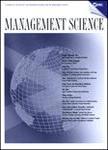-
作者:Wang, Shan; Liu, Nan; Wan, Guohua
作者单位:Shanghai Jiao Tong University; Boston College
摘要:Despite the prevalence and significance of walk-ins in healthcare, we know relatively little about how to plan and manage the daily operations of a healthcare facility that accepts both scheduled and walk-in patients. In this paper, we take a data-analytics approach and develop an optimization model to determine the optimal appointment schedule in the presence of potential walk-ins. Our model is the first known approach that can jointly handle general walk-in processes and heterogeneous, time-...
-
作者:John, Anett
作者单位:Institut Polytechnique de Paris; Ecole Polytechnique; ENSAE Paris
摘要:Commitment products can remedy self-control problems. However, imperfect knowledge about their preferences may (discontinuously) lead individuals to select into incentive-incompatible commitments, which reduce their welfare. I conducted a field experiment in which low-income individuals were randomly offered a new installment-savings commitment account. Individuals chose a personalized savings plan and a default penalty themselves. A majority appears to choose a harmful contract: While the ave...
-
作者:Zacharias, Christos; Yunes, Tallys
作者单位:University of Miami
摘要:We address the problem of designing appointment scheduling strategies in a stochastic environment accounting for patient no-shows, nonpunctuality, general stochastic service times, and unscheduled emergency walk-ins. A good appointment schedule seeks to help outpatient clinics to utilize their resources efficiently while containing patients' waiting times. The task of identifying an optimal schedule is modeled as a nonlinear integer program, where the objective function is the outcome of stoch...
-
作者:Butler, Jeffrey, V; Serra, Danila; Spagnolo, Giancarlo
作者单位:University of California System; University of California Merced; Southern Methodist University; Stockholm School of Economics; University of Rome Tor Vergata; Centre for Economic Policy Research - UK
摘要:Law-breaking activities within firms are widespread but difficult to uncover, making whistleblowing by employees desirable. We investigate if and how monetary incentives and expectations of social approval or disapproval from the public, and their interactions, affect an employee's decision to blow the whistle when the social damage from the reported misbehavior is more or less salient. Our analysis also has implications for the design and management of firms' internal whistleblowing channels.

